Most experts recommend getting at least eight hours of quality sleep per night, but that’s not always possible.
Whether you’re a student, an employee, or a business owner, you may find yourself having to stay up all night. The key to making it work is to plan things out.
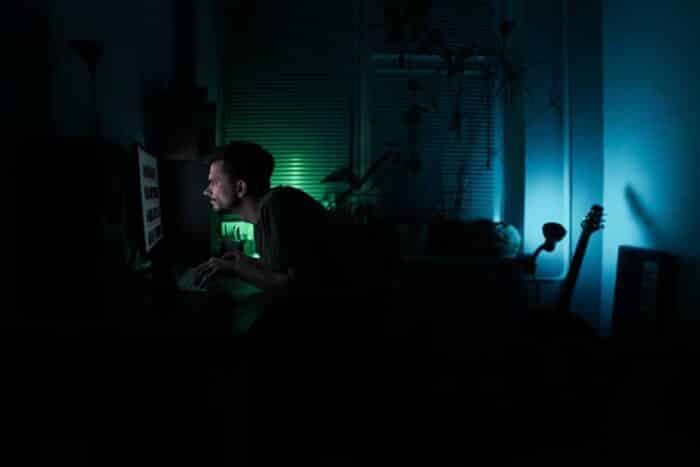
If you’re wondering how to pull an all-nighter, first make sure you actually need to do it. Skipping just one night of sleep can throw your body out of balance, affecting your memory, appetite, mood, and cognitive performance.
Ideally, try to get enough sleep the week before pulling an all-nighter. Next, follow the steps below.
How to Pull an All-Nighter in 10 Simple Steps
Today we’ll share our top tips for pulling an all-nighter. After reading this post, you should be better prepared to work or study until morning without ruining your health.
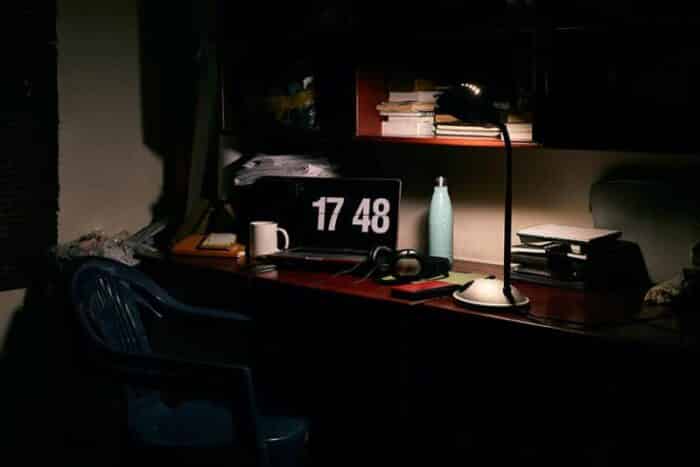
For starters, here’s a brief overview of what you should do if you absolutely have to stay up all night:
- Catch up on sleep beforehand: Try to get more sleep on the nights preceding the big day. If you’re well-rested, you’ll find it easier to stay focused and get things done.
- Take a longer nap: Try to sleep for at least one hour in the afternoon so you can feel energized later in the day.
- Time your caffeine intake: Use caffeine strategically to keep yourself awake during an all-nighter.
- Fill up on protein: Eat a high-protein meal or snack in the evening. This nutrient boosts wakefulness and supports brain function.
- Get some chewing gum: Research shows that chewing gum may increase alertness, productivity, and mental focus. Caffeinated chewing gum works even better.
- Plan your night: The more organized you are, the faster you’ll get things done.
- Create a stimulating environment: Don’t make yourself too comfortable. Turn down the thermostat, play some upbeat music, and take activity breaks every few hours.
- Crank up the lights: Bright lights suppress melatonin, the hormone that helps you fall and stay asleep.
- Minimize distractions: Use website blockers to reduce distractions and make every hour count.
- Use the Pomodoro Technique: This simple time-management method will keep you accountable, leading to higher productivity.
Now let’s take a closer look at these strategies and how to use them to survive an all-nighter.
#1. Catch up on sleep beforehand.
Pulling an all-nighter after several days of bad sleep is a recipe for disaster. Ideally, try to get plenty of sleep on the nights leading up to the big day, suggests Dr. Charles Czeisler.
Clinical evidence indicates that you can “bank sleep” prior to a busy period. At the very least, try to get enough shuteye the night before.
For example, if you’re able to sleep more over the weekend, you could pull an all-nighter on Monday.
#2. Take a longer nap.
Staying awake for 17 hours or longer can impair your thinking, memory, judgment, and mental focus, Joseph Ojile, M.D. told USA Today.
Going 24 hours without sleep is the equivalent of having a blood-alcohol content of 0.1%, reports the same source.
One way to mitigate these risks is to take a long nap before pulling an all-nighter. If possible, plan for one or two hours of sleep in the late afternoon. A power nap will do the trick, too.

According to WebMD, a 20-minute power nap can boost alertness, motor performance, and learning abilities. Napping for 30 to 60 minutes, on the other hand, may lead to better decision-making.
If you’re at work during the day, take a nap as soon as you arrive home. Better yet, eat a light meal or snack before hitting the sack.
#3. Time your caffeine intake.
As you probably know, caffeine increases your energy levels and mental focus. Depending on the dosage, it can also boost visual attention and reaction time.
Moreover, this natural stimulant may reduce cognitive failure during night work by half. Plus, it mitigates the effects of sleep inertia, a physiological state characterized by tiredness and impaired alertness after waking up.
What you may not know is that caffeine takes up to 75 minutes to kick in. Sports Nutrition Digest recommends drinking coffee about 45 to 60 minutes before exercise (or work) to get a boost of energy. If you’re not a fan of coffee, you can sip on energy drinks or take caffeine pills.
- Energy drinks take about 55 to 75 minutes to work (choose a sugar-free version to prevent energy crashes)
- Caffeinated chewing gum can boost your energy in less than 15 minutes
- Take caffeine pills about 35 to 45 minutes before starting work to increase your alertness
If you’re planning to take a short nap, drink a cup of coffee before going to bed. The energy-boosting effects of caffeine will kick in by the time you wake up.

Note that caffeine has a half-life of three to five hours, according to the American Academy of Sleep Medicine. One cup of coffee has 80 to 100 milligrams of caffeine, depending on its size and strength.
Therefore, if you drink a cup of java around 5 PM, you can get a second cup after 10 PM to survive an all-nighter.
#4. Fill up on protein.
Some foods are better than others when you need extra energy. Ideally, fill up on protein and ditch the sugar. As dietician Paula Mee told the BBC, protein boosts alertness. Carbs, on the other hand, can make you feel sleepy.
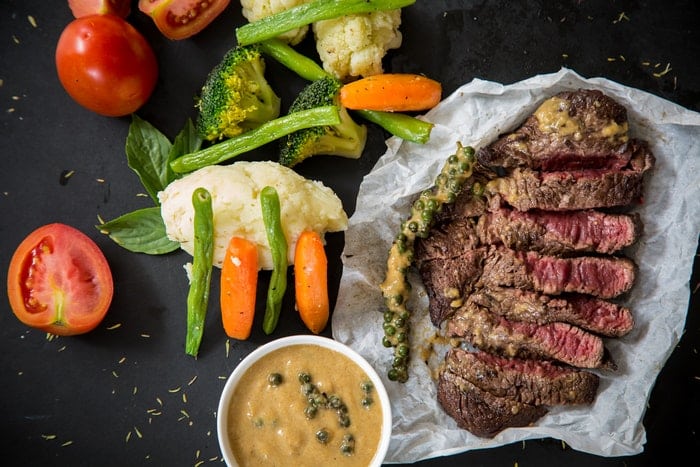
Mee recommends eating a light high-protein meal for dinner. Grilled salmon, chicken breast, steak, roasted turkey, or cottage cheese are all good choices.
If you’re not hungry, reach out for a high-protein snack, such as pumpkin seeds, almonds, beef jerky, or chia pudding. A low-carb, high-protein bar is a great option, too.
A 2011 study confirms these claims. As the researchers note, amino acids—which are the building blocks of protein—increase wakefulness and support brain function.
#5. Get some chewing gum.
As mentioned earlier, caffeinated chewing gum may increase your energy and alertness. Surprisingly, regular chewing gum works just as well, according to a 2015 study.

Scientists found that chewing gum boosts productivity, cognition, and attention, leading to higher work performance. Moreover, it has beneficial effects on mental well-being and overall mood. In some studies, it also reduced stress and cognitive errors.
Its energy-boosting effects last about 20 minutes, says Wired. Researchers attribute these potential benefits to the act of chewing, which increases wakefulness.
The evidence is mixed, but you can try this trick for a quick burst of energy.
#6. Plan your night.
Pulling an all-nighter can be mentally draining. The last thing you want is to waste valuable time wondering what to do next.
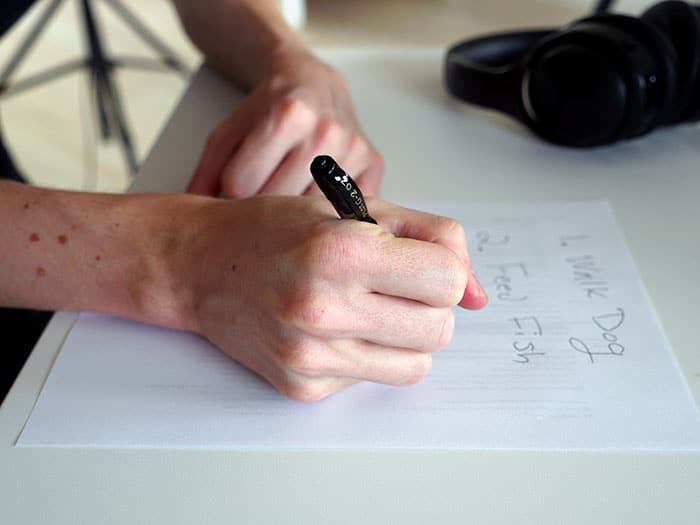
Draft a to-do list and gather all your materials beforehand. For example, if you’re planning to write a report, make sure you have all the data needed for the job. Use apps and browser extensions to organize your sources and work more efficiently.
Here are some tools that might come in handy:
- Session Buddy, a Chrome extension that allows users to save open tabs as collections and access them as needed
- Microsoft To-Do, a mobile and desktop app that allows you to create multiple to-do lists, take notes, and track your tasks
- Bitwarden, an app that automatically saves your passwords across all of your devices
- Evernote, a note-taking app that makes it easier to organize and manage your tasks
- Pocket, an app that enables users to save articles and videos in one centralized location
What matters most is to plan each step of the project you’re working on. The more organized you are, the faster you’ll get things done.
Consider starting with the hardest task and ending with the easiest one. If you tackle the easiest tasks first, you might get a false sense of progress and end up procrastinating.
#7. Create a stimulating environment.
While it can be tempting to work from bed, you might end up falling asleep. Instead, focus on creating a stimulating environment.

Here are some tips to help you out:
- Use a standing desk or sit on an exercise ball
- Go to the bathroom and splash some water on your face when you’re feeling sleepy
- Turn the temperature down by one or two degrees
- Have exercise breaks every two hours or so
- Drink ice-cold water rather than tea or hot chocolate
- Play some upbeat music in the background
- Use energizing scents, such as eucalyptus oil
These tricks might keep you from falling asleep and boost your alertness.
For example, the University of California, Berkeley recommends taking activity breaks to stay focused and prevent fatigue. These may include deep breathing exercises, stretching, walking, or short workouts.
Sure, no one expects you to train abs at 3 AM, but this doesn’t mean you should stay glued to your desk all night. Walk around the house, stretch your arms or legs, or do a set of squats to recharge your mind and body.
#8. Crank up the lights.
Most experts recommend dimming your lights before bedtime for a good night’s sleep. Bright light suppresses the production of melatonin, a hormone that helps you fall asleep.
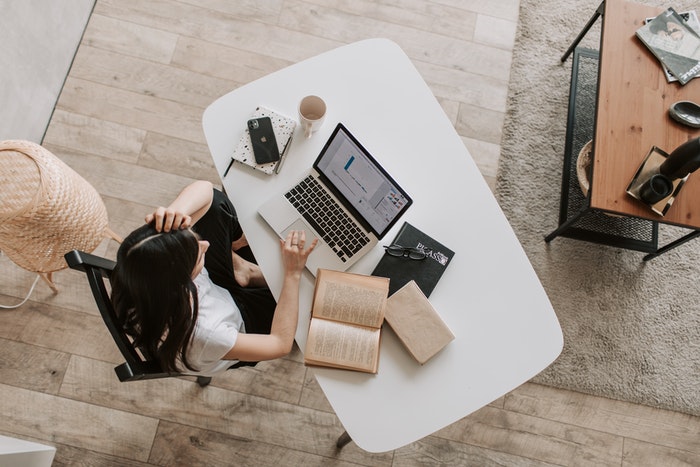
What this means is that you should crank up the lights and keep your room bright when pulling an all-nighter. Ideally, use a lamp that can simulate sunlight.
As neurobiologist Joëlle Adrien told the BBC, light tells your brain that it’s time to stay awake. She suggests using a blue-tinted light and avoiding yellow light, as it tends to relax the body.
#9. Minimize distractions.
The average person spends about two hours and 25 minutes on social media each day. With technology at your fingertips, it’s easy to get distracted and go down a rabbit hole of videos, tweets, or random posts.
As the night goes on, you’ll find it harder to stay focused. One way to minimize distractions is to use website blockers like Freedom, AppBlock, or FocusMe. These apps allow users to block distracting websites so they can focus on the tasks at hand.
Make sure you also turn off the TV and other gadgets you’re not using. You could even turn off your phone or switch to airplane mode until the next morning.
#10. Use the Pomodoro Technique.
When you pull an all-nighter, it’s important to work smarter, not harder. That’s where the Pomodoro Technique can help.

This time-management method has been around since the late ’80s. As Forbes, it’s ideal for most types of work, including repetitive tasks. When used right, it can boost your productivity and mental focus while reducing fatigue.
To get started, you’ll need a basic timer or app. Next, follow these steps:
- Pick an activity or task.
- Set the timer to 25 minutes.
- Take a short break when the timer rings.
- Start all over.
If you’re using the official Pomodoro app, you can schedule breaks of two, five, 15, or 30 minutes. The timer will ring when your break is over. Generally, it’s recommended to take a longer break every four sessions.
This method can make it easier to avoid distractions so you get things done faster. Plus, it keeps you accountable.
Is It That Bad to Pull an All-Nighter?
There’s something comforting about working or just doing your thing while everyone else is sleeping. You can finally focus on the tasks at hand, away from the hustle and bustle of everyday life.

Unfortunately, skimping on sleep is terrible for your health. The human brain becomes less efficient with each hour of sleep deprivation, according to the experts at Texas A&M College of Medicine.
This habit affects hormone production, working memory, metabolism, and cognitive function. Over time, it may lead to poor judgment and risky behavior. Some studies suggest that it might even alter your genes for years to come.
We won’t go into details about the effects of sleep deprivation, but you can read our guide on how long you can go without sleep. We’ll show you what happens when you don’t get enough shuteye and why a good night’s sleep is crucial for mental and physical well-being.
Make Every Hour Count
Now that you know how to pull an all-nighter, try to make every hour count. Plan it all out, avoid distractions, and use a timer to hold yourself accountable.

Pay attention to what you eat and drink, too. Some foods can boost your energy and alertness, while others may leave you feeling drained. Prioritize protein and cut back on sugar to function at your peak.
Ideally, try to schedule recovery time over the next few days. Avoid driving and other activities that require your full attention. Go easy on the caffeine and try to go to sleep earlier than usual.
Don’t expect to feel fresh after pulling an all-nighter. Your body needs time to recover from sleep loss and feel energized again. Our guide on how to stay awake at work might help, so be sure to check it out.
FAQ
The occasional all-nighter will not be that detrimental, assuming you have time to recover the next day and can make up for the lost time. Repeated all-nighters can be damaging to your body over time.
For your body, it would be better to sleep 2 hours than pull an all-nighter (and effectively sleep 0 hours).
That being said, sometimes all-nighters make sense. Ex: If you’re up late packing until 1 am and have to leave for the airport at 3 am for an early flight, it may be better to skip the sleep in this case so you don’t sleep through your alarm.
Skipping sleep from sun-down to sun-up is considered an all-nighter.
Citations
- Allen, A. P., & Smith, A. P. (2015, May 17). Chewing gum: Cognitive performance, mood, well-being, and associated physiology. BioMed Research International. Retrieved October 18, 2021, from https://www.hindawi.com/journals/bmri/2015/654806/.
- BBC. (n.d.). What the sleep doctors won’t tell you. BBC Worklife. Retrieved October 18, 2021, from https://www.bbc.com/worklife/article/20140902-how-to-pull-an-all-nighter.
- Collins, B. (2020, February 19). The Pomodoro Technique explained. Forbes. Retrieved October 18, 2021, from https://www.forbes.com/sites/bryancollinseurope/2020/03/03/the-pomodoro-technique/?sh=757fc4fc3985.
- Commissioner, O. of the. (n.d.). Spilling the beans: How much caffeine is too much? U.S. Food and Drug Administration. Retrieved October 18, 2021, from https://www.fda.gov/consumers/consumer-updates/spilling-beans-how-much-caffeine-too-much.
- Coughlin, T. (2019, July 31). Time your caffeine intake. Sports Nutrition Digest. Retrieved October 18, 2021, from https://sportsnutritiondigest.com/blog/timing-of-caffeine.
- Define_me. (n.d.). Retrieved October 18, 2021, from https://www.cell.com/neuron/fulltext/S0896-6273(11)00782-3.
- Details, A., & Thompson, — L. (2018, June 27). You asked: Is it bad for your health to pull an all-nighter? Vital Record. Retrieved October 18, 2021, from https://vitalrecord.tamhsc.edu/bad-for-health-to-pull-an-all-nighter/.
- G. Clay Whittaker | Published Jul 24, Health sleep sleep deprivation sleep science, Health, Sleep, Deprivation, S., & Science, S. (2021, April 26). Just one all-nighter can alter your genes, possibly for years to come. Popular Science. Retrieved October 18, 2021, from https://www.popsci.com/just-one-all-nighter-can-damage-your-circadian-clock/.
- Hafner, J. (2021, September 15). What happens if you don’t sleep for 24 hours? well, you’re basically drunk. USA Today. Retrieved October 18, 2021, from https://www.usatoday.com/story/news/nation-now/2017/03/22/what-happens-when-you-dont-sleep-24-hours-youre-basically-drunk/99488356/.
- Lehrer, J. (2011, November 29). The cognitive benefits of chewing gum. Wired. Retrieved October 18, 2021, from https://www.wired.com/2011/11/the-cognitive-benefits-of-chewing-gum/.
- Maryam KouchakiAssociate Professor of Management & Organizations. (n.d.). Why you should skip the easy wins and tackle the hard task first. Kellogg Insight. Retrieved October 18, 2021, from https://insight.kellogg.northwestern.edu/article/easy-or-hard-tasks-first.
- Published by Statista Research Department, & 7, S. (2021, September 7). Daily Social Media Usage Worldwide. Statista. Retrieved October 18, 2021, from https://www.statista.com/statistics/433871/daily-social-media-usage-worldwide/.
- Sleep and caffeine. Sleep Education. (2021, May 5). Retrieved October 18, 2021, from https://sleepeducation.org/sleep-caffeine/.
- Soong, J. (n.d.). Power naps: Napping benefits, length, and tips. WebMD. Retrieved October 18, 2021, from https://www.webmd.com/balance/features/the-secret-and-surprising-power-of-naps.
- TJ;, R. T. L. W. N. J. B. P. D. B. (n.d.). Banking sleep: Realization of benefits during subsequent sleep restriction and recovery. Sleep. Retrieved October 18, 2021, from https://pubmed.ncbi.nlm.nih.gov/19294951/.
- University Health Services. Activity Breaks | University Health Services. (n.d.). Retrieved October 18, 2021, from https://uhs.berkeley.edu/activitybreaks.
- Yasmin Anwar, M. R. M. 22, & Anwar, Y. (2015, July 9). Pulling an all-nighter can bring on euphoria and risky behavior. Berkeley News. Retrieved October 18, 2021, from https://news.berkeley.edu/2011/03/22/pulling-an-all-nighter/.



